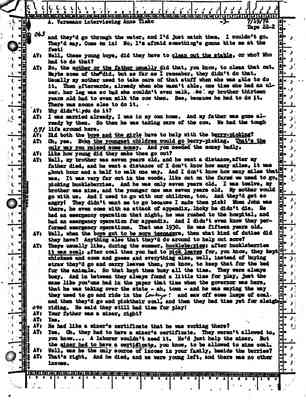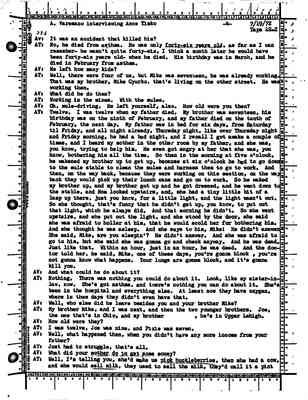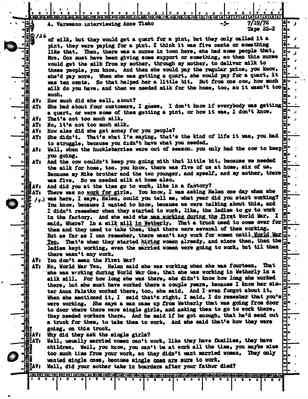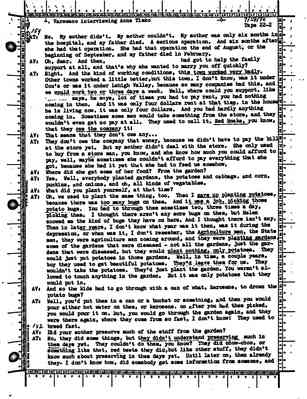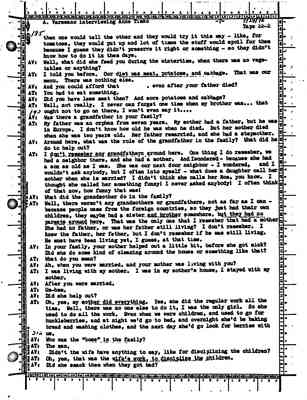Pages
38
A. Varesano interviewing Anne Timko -3- 7/19/72 Tape 22-2
and they'd go through the water, and I;d just watch them. I wouldn't go. They'd say, come in! No, I'm afraid something's gonna bite me at the feet! AV: Well, these young boys, did they have to clean out the stable, or who? Who had to do that? AT: No, the mother or the father usually did that, you kno, to clean that out. Maybe some of them did, but as far as I remember, they didn't do that. Usually my mother use to take care of that stuff when she was able to do it. Then afterwards, already when she wasn't able, one time she had an ulcer, her leg was so bad she couldn't even walk, so my brother thirteen years old had to even milk the cow then. See, because he had to do it. There was no one else to do it. AV: Why didn't you do it? AT: I was married already, I was in my own home. And my father was gone already by then. So then he was taking care of the cow. We had the touch life around here. AV: Did both the boys and the girls have to help with the berry-picking? AT: Oh, yes. Even the youngest children would go berry-picking. That's the only way you raised some money. And you needed the money badly. AV: Like how young did they make them go out? AT: Well, my brother was seven years old, and he went a distance, after my father died, and he went a distance of I don't know how many miles that was. It was very far out in the woods, like out on the farms we used to go, picking huckleberries. And he was only seven years old. I was twelve, my brother was nine, and they younger one was seven years old. My mother would go with us. And I used to go with our children, too. And they'd get so angry! They didn't want me to go because I made them pick! When John was there, he even come with an attack of appendis, lucky he didn't die. He had an emergency operation that night, he was rushed to the hospital, and had an emergency operation for appendix. And I didn't even know they performed emergency operations. That was 1930. He was fiftenn years old. AV: Well, when the boys got to be more teenagers, then what kind of duties did they have? Anything else that they'd do around to help out more? AT: There usually like, during the summer, huckleberries; after huckleberries it was coal; after coal then you had to pick leaves for, you know, they kept chickens and cows and geese and everything else, well, instead of buying straw they'd go and carry leaves then, you know, to keep that for the bed for the animals. So that kept them busy all the time. They were always busy. And in between they always found a little time for play, just the same like you'uns had in the paper that time when the governor was here, that he was taking over the state - ah, town - and he was saying the way they used to go and ride in the and saw off some lumps of coal and then they'd go and pick their coal, and then they had time yet for sleigh riding. He said they still had time for play! AV: Your father was a miner, right? AT: Yes. AV: He had like a miner's certificate that he was working there? AT: Yes. Oh, they had to have a miner's certificate. They weren't allowed to, you know..... A laborer wouldn't need it. He'd just help the miner. But the miner had to have a certificate, you know, to be allowed to mine coal. AV: Well, was he the only source of income in your family, beside the berries? AT: That's right. And he died, and we were young left, and there was no other income.
39
A. Varesano interviewing Anne Timko -4- 7/19/72 Tape 22-2
AV: It was an accident that killed him? AT: No, he died from asthma. He was only forty-six years old, as far as I can remember - he wasn't quite forty-six, I think a month later he would have been forty-six years old - when he died. His birthday was in March, and he died in February from asthma. AV: He left how many kids? AT: Well, there were four of us, but Mike was seventeen, he was already working. That was my brother, Mike Gyurko, that's living on the other street. He was working then. AV: What did he do then? AT: Working in the mines. With the mules. AV: Oh, mule-driving. He left yourself, also. How old were you then? AT: Twelve. I was twelve when my father died. My brother was seventeen, his birthday was on the ninth of Febrary, and my father died on the tenth of February, the next day. My father was in bed for six days, from Saturday til Friday, and all night already, Thursday night, like over Thursday night and Friday morning, he had a bad night, and I recall I got awake a couple of times, and I heard my mother in the other room by my father, and she was, you know, trying to help him. He even got angry at her that she was, you know, bothering him all the time. So then in the morning at five o'clock, he wakened my brother up to get up, because at six o'clock he had to go down to the mule stable to clean the mules and harness them to go to work. And then, on the way back, because they were working on this section, on the way back they would pick up their lunch cans and go on to work. So he waked my brother up, and my brother got up and he got dressed, and he went down to the sable, and Mom looked upstairs, and, she had a tiny little bit of a lamp up there, just you know, for a little light, and the light wasn't out. So she thought, that's funny that he didn't get up, you know, to put out that light, which he always did. And that morning he didn't. So she went upstairs, and she put out the light, and she stood by the door, she said she was afraid to holler at him, that he would scold her for bothering him. And she thought he was alseep. And she says to him, Mike! He didn't answer. She said, Mike, are you sleepin'? He didn't answer. And she was afraid to go to him, but she said she was gonna go and check anyway. And he was dead. Just like that. Within an hour, just an hour, he was dead. And the doctor told her, he said, Mike, one of these days, you're gonna block, you're no gonna know what happens. Your lungs are gonna block, and it's gonna kill you. AV: And what could he do about it? AT: Nothing. There was nothing you could do about it. Look, like my sister-in-law, now. She's got asthma, and there's nothing you can do about it. She's been in the hospital and everything else. At least now they have oxygen, where in them days they didn't even have that. AV: Well, who else did he leave besides you and your brother Mike? AT: My brother Mike, and I was next, and then the two younger brothers. Joe, the one that's in Ohio, and my brother , he's in Upper Lehigh. AV: How old were they? AT: I was twelve, Joe was nine, and Pixie was seven. AV: Well, what happened then, when you didn't have any more income from your father? AT: Just had to struggle, that's all. AV: What did your mother do to get some money? AT: Well, I'm telling you, she'd make us pick huckleberries, then she had a cow, and she would sell milk, they used to sell the milk, they'd call it a pint
40
A. Varesano interviewing Anne Timko -5- 7/19/72 Tape 22-2
of milk, but they would get a quart for a pint, but they only called it a pint, they were paying for a pint. I think it was five cents or something like that. Then, there was a nurse in town here, she had some people that, Mrs. Cox must have been giving some support or something, so then this nurse would get milk from my mother, through my mother, to deliver milk to these peoplepeople, you know. And then she would pay the regular price, you know, she's pay more. When she was getting a quart, she would pay for a quart, it was ten cents. So that helped her a little bit. But from one cow, how much milk do you have, and then we needed milk for the home, too, so it wasn't too much. AV: How much did she sell, about? AT: She had about four customers, I guess. I don't know if everybody was getting a quart, or were some of them getting a pint, or how it was, I don't know. AV: That's not too much milk. AT: No, it's not too much milk. AV: How else did she get money for you people? AT: She didn't. That's what I'm saying, that's the kind of life it was, you had to struggle, because you didn't have what you needed. AV: Well, when the huckleberries were out of season, you only had the cow to keep you going. AT: And the cow couldn't keep you going with that little bit, because we needed the milk for home, too, you know, there was five of us at home, six of us. Because Mike my brother and the two younger, and myself, and my mother, there was five. So we needed milk at home also. AV: And did you at the time go to work, like in a factory? AT: There as no work for girls. You know, I was asking Helen one day when she was here, I says, Helen, could you tell me, what year did you start working? You know, because I wanted to know, because we were talking about this, and I didn't remember when they started to work, like, the ladies to go to work in the factory. And she said she was working during the first World War. I said, Where? In a silk mill in Weatherly. That a truck used to come over for them and they used to take them, that there were several of them working. But as far as I can remember, there wasn't any work for women until World War Two. That's when they started hiring women already, and sisnce then, then the ladies kept working, even the married women were going to work, but til then there wasn't any work. AV: You don't mean the First War? AT: No, World War Two. Helen said she was working when she was fourteen. That she was working during World War One, that she was working in Weatherly in a silk mill. For how long she was there, she didn't know how lng she workied there, but she must have worked there a couple years, because I know her sister Anna Falatko worked there, too, she said. And I even forgot about it. When she mentioned it, I said that's right, I said, I do remember that you's were working. She says a man came up from Weatherly that was going from door to door where there were single girls, and asking them to go to work there, they needed workers there. And he said if he got enough, that he'd send out a truck for them, to take them to work. And she said that's how they were going , on this truck. AV: Why did they ask the single girls? AT: Well, usually married women can't work, like they have families, they have children. Well, you know, you can't be at work all the time, maybe miss too much time from your work, so they didn't want married women. They only wanted single ones, because single ones are sure to work. AV: Well, did your mother take in boarders after your father died?
41
A. Varesano interviewing Anne Timko -6- 7/19/72 Tape 22-2
AT: No. My mother didn't. My mother couldn't. My mother was only six months in the hospital, and my father died. A serious operation. And six months after she had that operation. She had that operation the end of August, or the beginning of September, and my father died in Febrary. AV: Oh, dear. And then, had got to help the family support at all, and that's why she wanted to marry you off quickly? AT: Right. And the kind of working conditions, this town worked very badly. Other towns worked a little better, but this town, I don't know, was it under Cox's or was it under Lehigh Valley, becuase so many companies had this, and we would work two or three days a wek. Well, where could you suppport, like says, he says, lot of times you had to pay rent, you had nothing coming in then. And it was only four dollars rent at that time, in the house he is living now, it was only four dollars. And you had hardly anything coming in. Sometimes some men would take something from the store, and they wouldn't even get no pay at all. They used to call it Red Snake, you know that they owe the company it! AV: That means that they don't owe any.... AT: They don't owe the company that money, because we didn't have to pay the bill at the store yet. But my mother didn't deal with the store. She only used to buy from a store man, you know, and she know ho wmuch you could afford to pay, well, maybe sometimes she couldn't afford to pay everything that she got, because she had it yet that she had to feed us somehow. AV: Where did she get some of her food? From the garden? AT: Yes. Well, everybody planted gardens, the potatoes and cabbage, and corn, pumpkins, and onions, and oh, all kinds of vegetables. AV: Whe did you plant yourself, at that time? AT: Oh, we used to plant the same thing, too. Then I gave up planting potatoes, because there was too many bugs on them. And it was a job, picking those potato bugs. You had to through them sometimes two, three times a day, picking them. I thought there aren't any more bugs on them, but Helen showed me the kind of bugs they have on hers. And I thought there isn't any. Then in later years, I don't know what year it was then, was it during the depression, or when was it, I don't remember, the Agriculture men, the State men, they were agriculture men coming around, and they were planting gardens, some of the gardens that were diseased - not all the gardens, just the gardens that were diseased, but they would plant nothing, only potatoes. They would just put potatoes in those gardens. Well, in time, a couple years, would just put potatoes in those gardens. Well, in time, a couple years, boy they used to get beautiful potatoes. They'd leave them for us. They wouldn't take the potatoes. They'd just plant the garden. You weren't allowed to touch anything in the garden. But it was only potatoes that they would put in. AV: And so the kids had to go through with a can of what, kerosene, to drown the potato bugs? AT: Well, you'd put them in a can or a bucket or something, and then you would pour either hot water on them, or kerosene, on after you had them picked, you would pour it on. But, you would go through the garden again, and the were there again, where they come from so fast, I don't know! They used to breed fast. AV: Did your mother preserve much of the stuff from the garden? AT: No, they did some things, but they didn't understand preserving much in them days yet. They couldn't do them, you know? They did chow-chow, or something like that, red beets they did, but like other stuff, they didn't know much about preserving in them days yet. Until later on, then already they - I don't know how, did somebody get some information from someone, and
42
A. Varesano interviewing Anne Timko -7- 7/19/72 Tape 22-2
then one owuld tell the other and they would try it this way - like, for tomatoes, they would put up and lot of times the stuff would spoil for them because I guess they didn't preserve it right or something - so they didn't know how to do it in them days. AV: Well, what did she feed you during the wintertime, when there was no vegetables or anything? AT: I told you before. Our diet was meat, potatoes, and cabbage. That was our menu. There was nothing else. AV: And you could afford that, even after your father died? AT: You had to eat something. AV: Did you have less meat then? And more potatoes and cabbage? AT: Well, not really. I never can forget one time when my brother was...that ought not to go there, I won't even say it... AV: Was there a grandfather in your family? AT: My father was an orphan from seven years. My mother had a father, but he was in Europe. I don't know how old he was when he died. But her mother died when she was two years old. Her father remarried, and she had a stepmother. AV: Around here, what was the role of the grandfather in the family? What did he do to help out? AT: I don't remember any grandfathers around here. One thing I do remember, we had a neighbor there, and she had a mother. And Iwondered - because she had a son as old as I was. She was our next door neighbor - I wondered, and I wouldn't ask anybody, but I often into myself - what does a daughter call her mother when she is married? I didn't think she calls her Mom, you know. I thought she called her something funny! I never asked anybody! I often think of that now, how funny that was! AV: What did the grandmother do in the family? AT: Well, there weren't any grandmothers or grandfathers, not as far as I can - because people came from the foreign countries, so they just had their own children, they maybe had a sister and brother somewhere, but they had no parents around here. That was the only one that I can remember that had a mother. She had no father, or was her father still living? I don't remember. I knew the father, her father, but I don't remember if he was still living. He must have been living yet, I guess, at that time. AV: In your family, your mother helped out a little bit, before she got sick? Did she do some kind of cleaning around the house or something like that? AT: What do you mean? AV: Ah, when you were married, and your mother was living with you? AT: I was living with my mother. I was in my mother's house. I stayed with my mother. AV: After you were married. AT: Um-hum. AV: Did she help out? AT: Oh, yes, my mother did everything. Yes, she did the regular work all the time. Well, there was no one else to do it, I was the only girl. So she used to do all the work. Even when we were children, and used to go for huckleberries, and at night we'd go to bed, and overnight she'd be baking bread and washing clothes, and the next day she'd go look for berries with us. AV: Who was the "boss" in the family? AT: The man. AV: Didn't the wife have anything to say, like for disciplining the children? AT: Oh, yes, that was the wife's work, to discipline the children. AV: Did she smack them when they got bad?
